Important: Before proceeding with this tutorial, make sure you have read and understood this Bitcoin and Cryptocurrency Security Best Practices Manual.
The advice provided on cryptocurrency and/or bitcoin trading is for informational and educational purposes only and does not constitute financial advice or investment recommendations. The cryptocurrency market, including bitcoin, is highly volatile and poses significant risks. Any investment decision or transaction made based on the provided information is the sole responsibility of the user. We strongly recommend conducting thorough research, consulting professional financial advisors, and considering your own financial situation and risk tolerance before engaging in any cryptocurrency and/or bitcoin-related activities. We are not responsible for any loss or damage resulting from the misuse of the provided information.
Since the approval of new anti-money laundering laws by the majority of committees in the European Parliament, fear and apprehension surrounding anonymous cryptocurrency wallets have spread like a dense fog originating from within the forest.
The problem with fog is that it expands rapidly and obscures our vision, even showing things that seem not to be there and vice versa.
This is what has happened with anonymous wallets, the phenomenon of fog (as I like to call it).
As Patrick Hansen, Director of EU Strategy for Circle, clarified in X, the new laws do not directly prohibit self-custody wallets or peer-to-peer (P2P) cryptocurrency payments.
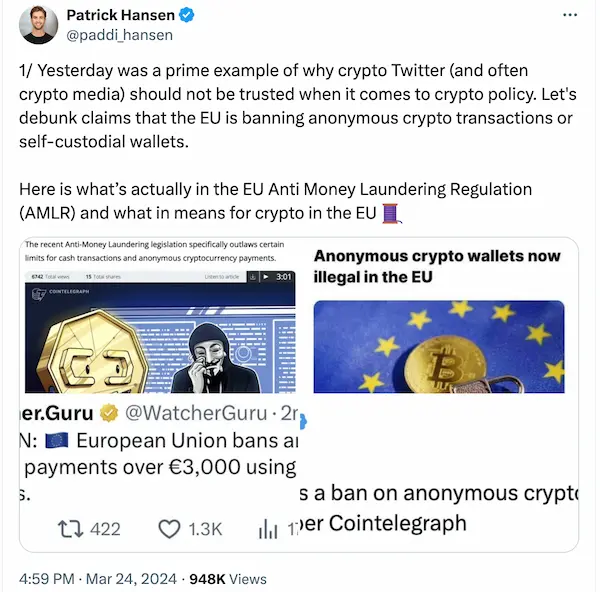
So, what is real and what isn’t? Because following controversial headlines like Finbold’s “Anonymous crypto wallets now illegal in the EU” or the one from the popular outlet Crypto Insiders “your anonymous cryptocurrency wallet is now illegal,” we no longer know what to think.
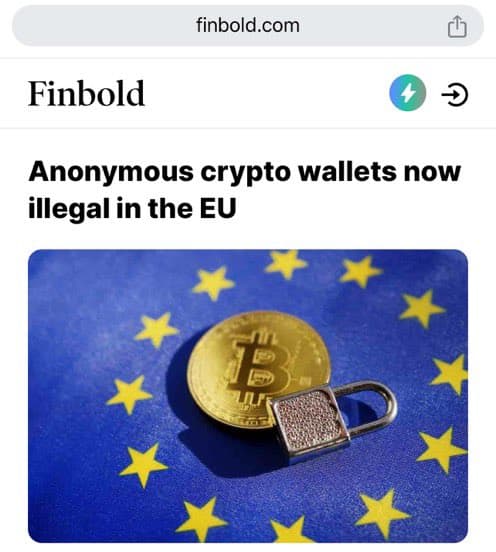
The truth about anonymous or non-custodial wallets in 2024
No one has said (except for Finbold and a few other media outlets lost in the fog) that anonymous wallets are illegal; in fact, they are not.
So, what’s being said?
The truth about anonymous wallets is that EU regulation, specifically the AMLR Directive (anti-money laundering regulations), does not directly prohibit anonymous cryptocurrency wallets but rather regulates payments made with them.
Material’s legal team has thoroughly reviewed the regulations, concluding that there is currently no EU regulation that expressly prohibits the use of self-hosted wallets. There are no plans to prohibit them in the future. A transaction from one self-hosted wallet to another is impossible to detect, so prohibiting their use does not make sense, at least with current technology.
Payments from anonymous wallets
Cash payments exceeding 3,000 euros in commercial transactions and 10,000 euros in business transactions are subject to restrictions. This means that, above these amounts, cash payments are prohibited, and transactions must be conducted through more traceable payment methods such as bank transfers or electronic payments.
What about exchanges?
The measures taken under this regulation imply that providers of cryptographic asset services (CASPs), such as exchanges, will not be able to offer anonymous accounts.
In other words, all individuals who want to trade cryptocurrencies through a regulated service will need to provide personal identification information in accordance with KYC/AML procedures.
Although the regulation does not directly affect self-custody wallets, anonymous wallets, or the users who use them, it may influence the ease with which anonymous transactions can be conducted, especially if exchanges and other regulated services restrict transactions to and from anonymous wallets.
Prevention or control?
Although this initiative aims to present itself as a prevention measure against money laundering and other illegal activities, it remains a severe measure against individual privacy and financial freedom and represents further control by banks and institutions.

As pointed out by Patrick Breyer (Member of the European Parliament) in his post, these measures seem to be part of “the war on cash” and go against citizens’ financial freedom, promoting greater banking dependence and lack of privacy.
Cryptocurrencies, the internet’s cash
As Patrick highlights, numerous organizations and entities rely on anonymous donations, citing examples such as Alexei Navalny and WikiLeaks.
Cryptocurrencies are the cash of the internet
In a world where financial regulations are constantly changing and becoming increasingly stringent, using an anonymous wallet like Material becomes indispensable to protect our privacy and individual autonomy.
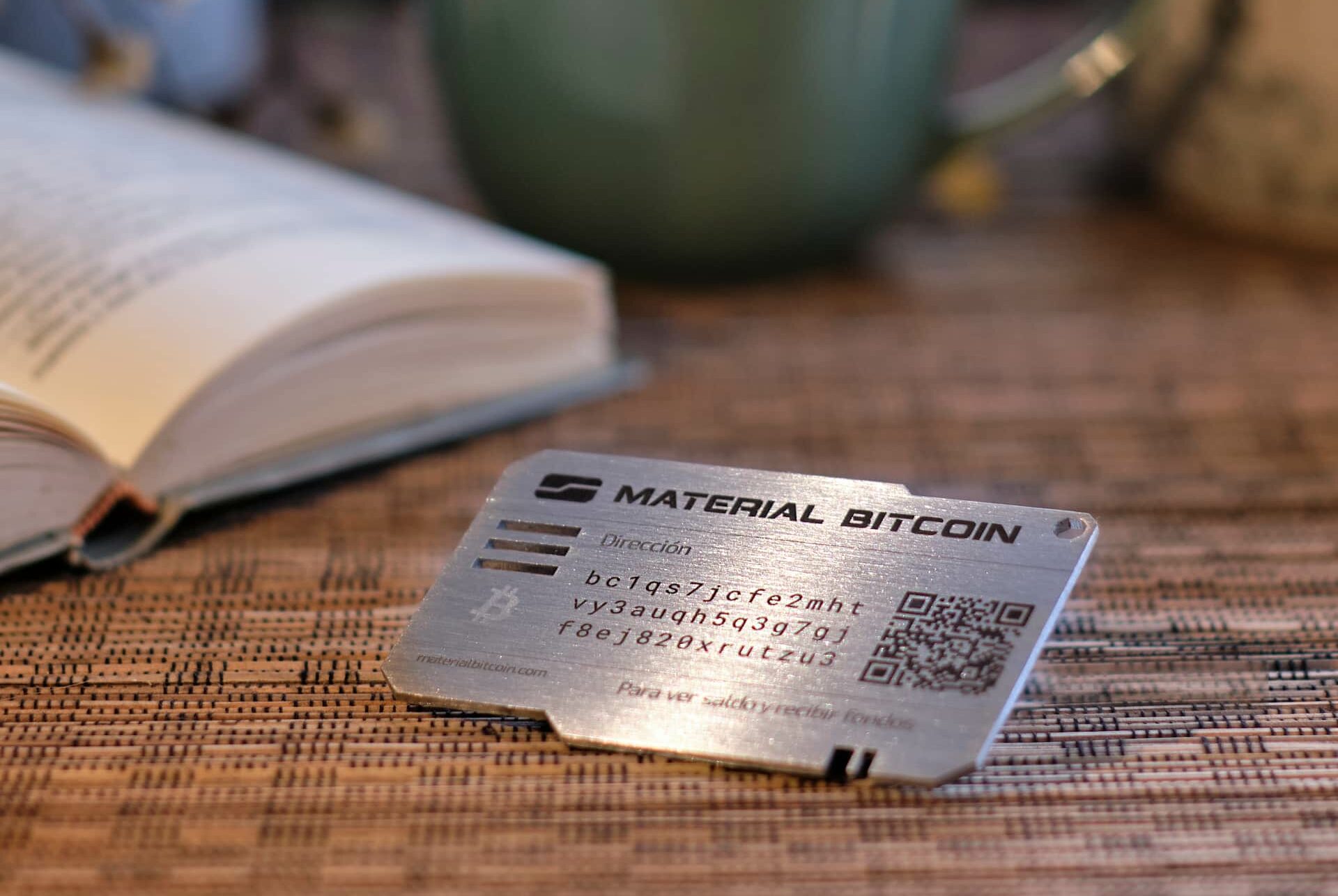
FAQ
What are anonymous or non-custodial wallets?
Anonymous or non-custodial wallets are simply digital wallets that allow you to store and manage cryptocurrencies without having to provide your personal information.
How much can I spend with an anonymous wallet without restriction?
Considering the new laws of the European Union, you can anonymously spend up to €2,999 without restrictions.
What anonymous wallets are available?
Among the most popular anonymous wallets are Material, Trezor, Ledger, and Safepal.
Can exchanges offer anonymous accounts?
No, all individuals who want to trade cryptocurrencies through a regulated service will need to provide personal identification information in accordance with KYC/AML procedures.

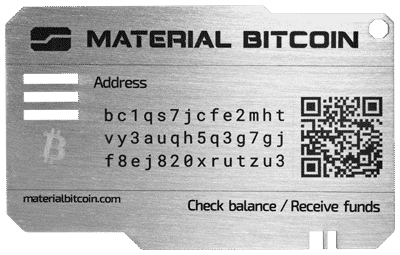

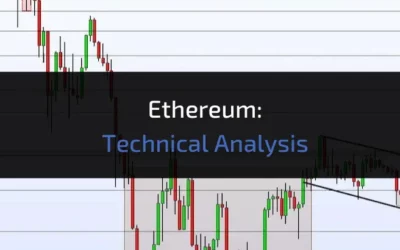



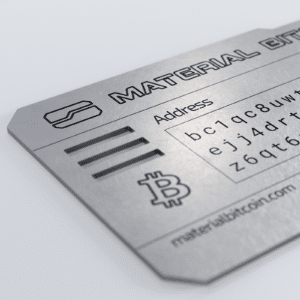

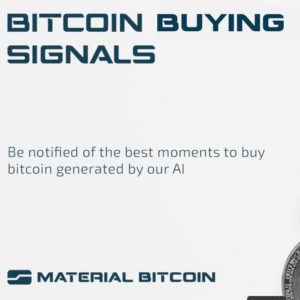
0 Comments